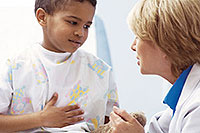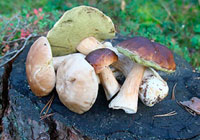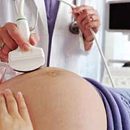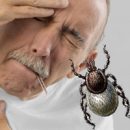Intestinal infections - real summer attacks. Each of us at least once in life came across these troubles, they are exposed to old and young. Nevertheless, we do not know well about the causes of these diseases. How to avoid intestinal disorders and quickly cure from infection?
Content
What is an intestinal infection?
 Intestinal infection is a large group of infectious diseases that damage the gastrointestinal tract. The cause of infection can be viruses, bacteria, as well as their products of their livelihoods (toxins). Intestinal diseases vary in gravity of leakage and speed of cure. For example, staphylococcal infection is relatively rapidly curable, while cholera is a very dangerous and serious disease. Of course, in our days, deadly infections are extremely rare, but the troubles of light and moderate severity experienced, probably, each.
Intestinal infection is a large group of infectious diseases that damage the gastrointestinal tract. The cause of infection can be viruses, bacteria, as well as their products of their livelihoods (toxins). Intestinal diseases vary in gravity of leakage and speed of cure. For example, staphylococcal infection is relatively rapidly curable, while cholera is a very dangerous and serious disease. Of course, in our days, deadly infections are extremely rare, but the troubles of light and moderate severity experienced, probably, each.
According to statistics, intestinal infections can be attributed to these seasonal diseases, whose peak falls on the summer. The reasons for this seasonality are several:
- In the summer, we are more often drinking from the tap and from the springs;
- In the summer, we more often consume fresh vegetables and fruits that are not always thoroughly washed and disinfected;
- In the summer, food products (especially meat, milk, fish) are spoiled faster, although the signs of deterioration can be practically invisible;
- In summer, a large number of insects appear - infection carriers (proved, for example, that on the body of one fly moves to 10 million bacteria! It remains only to guess how many of them are pathogens);
- In the summer we drink more water, which dilutes gastric juice, relaxing its protective effect.
Really we are not protected?
As we just mentioned, in the body there are mechanisms for protection against infection. Thus, the first line on the path of penetration of infection is saliva, which has bactericidal properties. It is important to carefully chew food so that it is as impregnated with saliva, which is not only disinfecting pathogenic microorganisms, but also contributes to better digestion. Then the gastric juice, and the acid medium does not favor the reproduction of pathogens. And finally, in a thin and thick intestine, in a mucus that envelops the walls of the digestive tract, a lot of useful microorganisms live. They create a friendly microflora and save from many troubles . Interestingly, the general condition of the body and our immune system affects the work of the following mechanisms. So, constant stress, improper nutrition, long-term treatment with antibiotics lead to the weakening of natural protection, and we are becoming victims of intestinal infection. In addition, many pathogenic organisms find special workarounds against which natural protection is powerless.
How does infection occurs?
With water, food, with dirty hands in the mouth gets viruses and bacteria. These microbes are then transported in the stomach and intestines, where they begin to actively multiply and produce various toxins. These substances violate the permeability of cell membranes, interfere with the course of biochemical processes, lead to an imbalance of important salts, minerals and moisture loss.
Unpleasant symptoms
As you already guess, trouble begins with common lethargy, weakness, poor appetite, it is possible a feeling of gravity in the stomach, headaches, fatigue in the eyes. A little later, vomiting, diarrhea, abdominal pain, possibly high temperature, chills. On average, from the moment of microbes entering the body, unpleasant symptoms appear within 6-48 hours.
Than dangerous intestinal infections?
Of course, frequent urges and violation of the chair - already on themselves unpleasant. However, the main danger of intestinal infections is the rapid dehydration of the body. The fact is that with vomiting and liquid feces, we lose a lot of moisture, and the broken balance of sodium and potassium ions prevents the rapid restoration of water resources. Violation of water exchange leads to a collapse of the cardiovascular system, a violation of the work of the kidneys, confusion of consciousness. In the old age, the kids and in the elderly, intestinal infection can end with fatal.
Treatment
Treatment of intestinal infections is carried out in several directions: these are neutralization of toxins, restoration of water balance, as well as the destruction of pathogenic microbes. It should be noted that vomiting and diarrhea is a kind of protective reactions, thus the body gets rid of alien substances . That is why one should not restrain the vomiting, but on the contrary, it is useful to call it. In addition, therapeutic activities begin with intestinal washing (enema). For the belief, it is necessary to use boiled cool water (20-25 degrees). After the procedure, it's time to proceed to medication treatment.
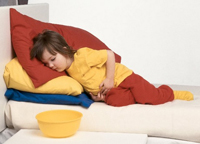 To neutralize toxins and eliminate diarrhea, are primarily sorbents . It is all known activated coal (preferably in powder, it has better adsorbing ability), «Smekt», «Polyface», «Attapulgit» . In order not to provoke the development of bacteria, at the time of sharp symptoms of infection is better practically abandoning food. Will not damage lean oatmeal and rice porridge. They have an enveloping effect, so there is a soothing effect on irritated intestines.
To neutralize toxins and eliminate diarrhea, are primarily sorbents . It is all known activated coal (preferably in powder, it has better adsorbing ability), «Smekt», «Polyface», «Attapulgit» . In order not to provoke the development of bacteria, at the time of sharp symptoms of infection is better practically abandoning food. Will not damage lean oatmeal and rice porridge. They have an enveloping effect, so there is a soothing effect on irritated intestines.
To fill the reserves of trace elements and restore the water balance, it is necessary to drink boiled water with a content of various salts. Such mixtures can be purchased at the pharmacy. This is «Oral», «Citroglyukosolan», «Regidron», «Begidron» . Such solutions must be taken by several sips with an interval of 10-15 minutes. Generally, abundant drinking (frequent, but small portions) - the key to successful recovery. Tea is suitable, compote from dried fruits, herbal tea.
Feeling the first symptoms of intestinal ailments, many of us accepted antibiotics. This is not a completely wise decision, since only a part of intestinal infections is caused by the presence of bacteria in the intestine. A large proportion of diseases are associated with viruses (which antibiotics do not work), or with toxins that have already arrived. Not only are antibiotics in these cases ineffective, they still disturb the friendly, natural intestinal microflora, which slow down the recovery and restoration of the normal function of the gastrointestinal tract. In general, about the reception of antibiotics should be consulted with a doctor and carry out an accurate diagnosis: what exactly causes an intestinal infection in each case . Since in the summer in the class-field conditions, the doctor's consultation is often unavailable, from receiving antibiotics should be abstained.
Today, the receptions of new drugs are becoming increasingly popular, which is activated, restore the useful intestinal microflora and pathogenic bacteria helps. Such means are called Eubiotics. These include «Bifidumbacterin», «Lactobacterin» and others.
In what cases you need to urgently consult a doctor?
- Vomiting is so strong that you can not consume liquid (such a state is fraught with rapid exhaustion of moisture reserves);
- Very high temperature (large load on the heart);
- Blood presents in feces.
It is advisable to visit the doctor if the patient is a child or an elderly, weakened person. Note that the symptoms of intestinal infections are similar to other severe diseases (for example, the oncology of the gastrointestinal tract), so if the patient's condition does not improve, it is necessary to seek qualified medical care.
When the patient is near you.
Since intestinal infections are infectious, precautions should be observed when communicating with a sick family member. Microbes are transmitted with dishes, remain on other subjects (door handles, computer keyboard and t.D.) The patient itself should try to wash your hands thoroughly after visiting the toilet. He needs to highlight a separate dishes, and the rest of the kitchen objects boil or treat the disinfectant.
Prevention
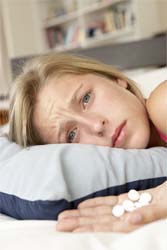 The prevention rules may seem too obvious, however, once intestinal infections attack, it means that prevention is not as effective as it could be. So, to avoid intestinal infections:
The prevention rules may seem too obvious, however, once intestinal infections attack, it means that prevention is not as effective as it could be. So, to avoid intestinal infections:
- Wash your hands before eating;
- in the summer period, refrain from the use of confectionery with cream prepared on fresh eggs;
- Keep raw meat and fish separately from finished dishes in the refrigerator;
- Wash fruit thoroughly, vegetables, greens (to get rid of the inconspicable eye of pollution, the greens better soak 5-7 minutes in a weakly mass solution);
- Store fresh vegetable salads for more than a few hours, try to use only freshly prepared food;
- When buying meat and dairy products, give preference to factory packaging, be sure to make sure on the expiration date;
- Drink only boiled water or «Mineralo», acquired in well-known stores.
If this year you still have replenished unpleasant statistics and suspect that the cause of infection has become poor-quality water or food, feel free to contact the nearest sanitary and epidemiological station. Your vigilance can be the key to the health of babies in kindergarten, your neighbors, family members and loved ones.



